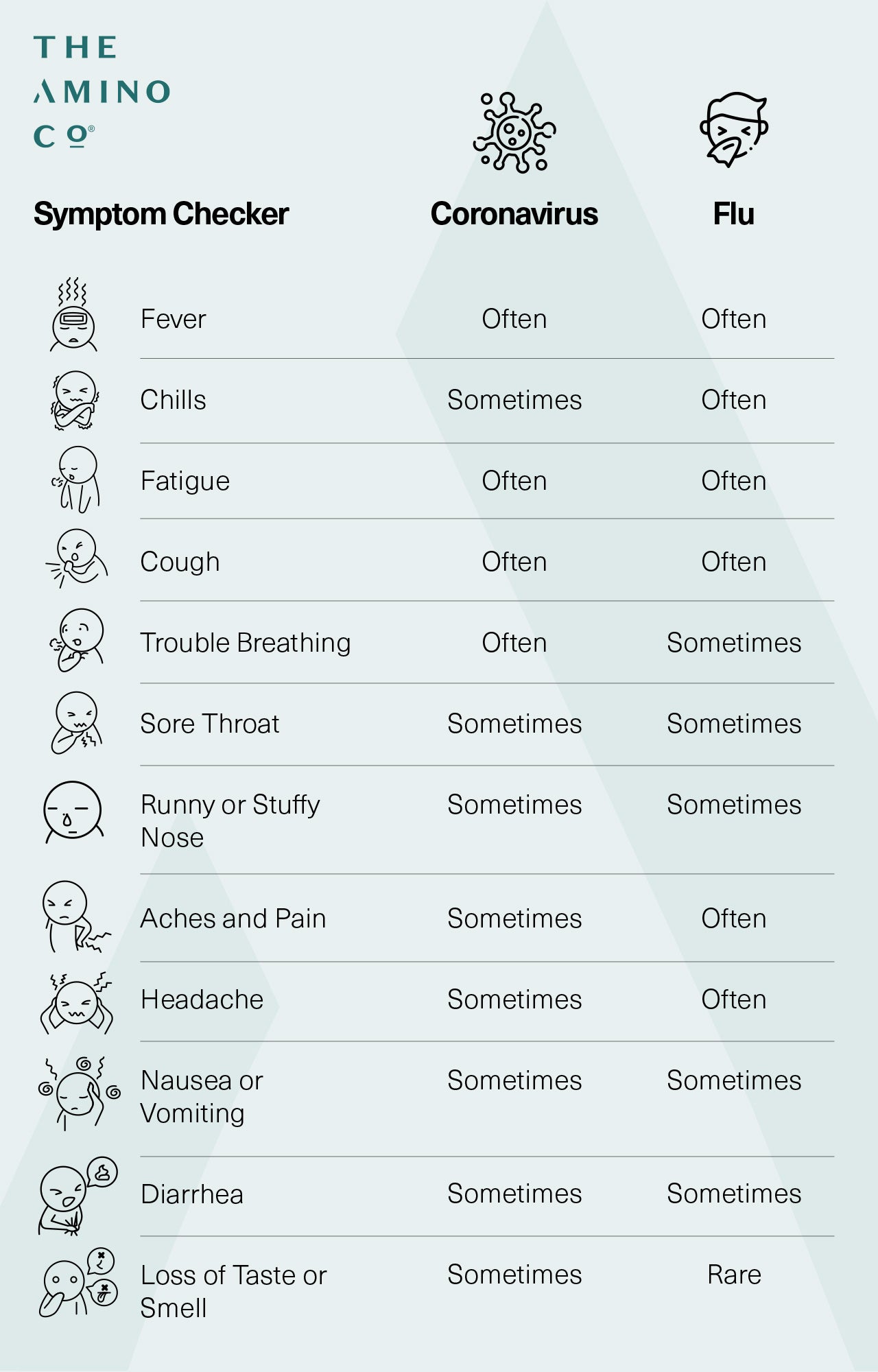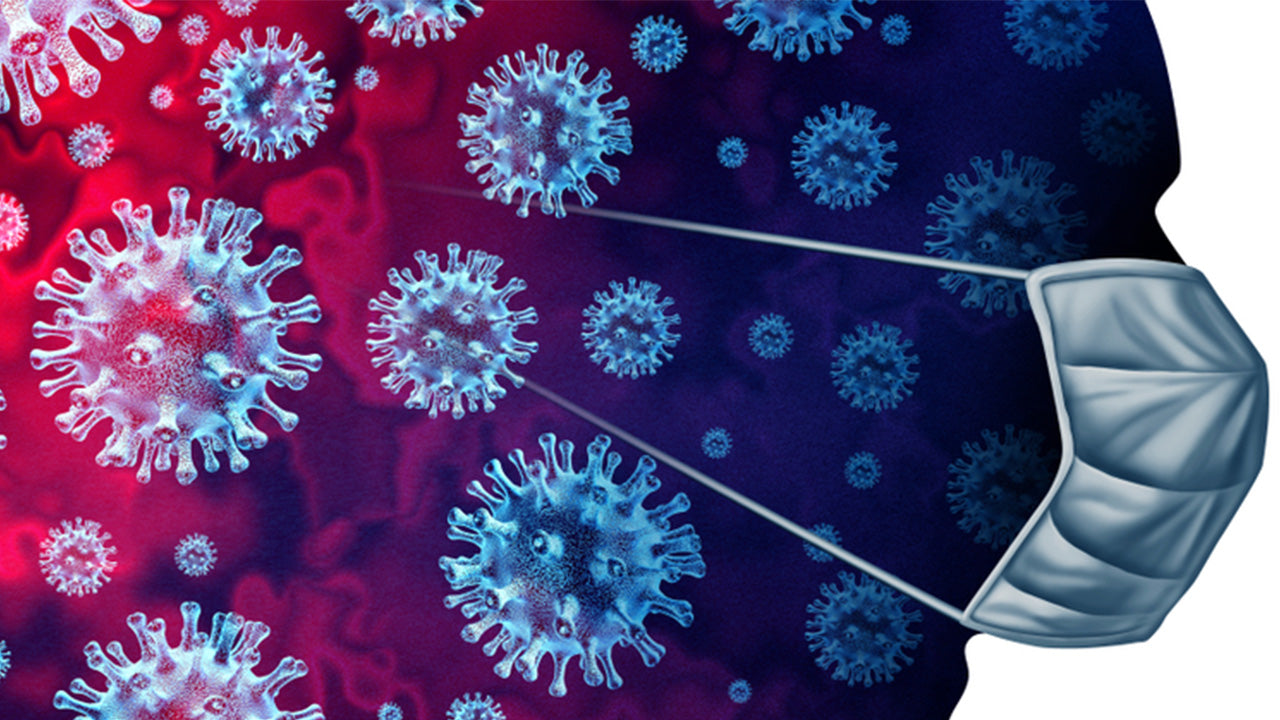Flu vs. COVID: Which Virus Have You Got?
 By: by Amino Science
By: by Amino Science

Flu vs. COVID. When it comes to knowing which virus you’ve got, there aren’t a ton of differences in symptoms. Both are contagious respiratory illnesses, both can cause respiratory distress, and both can be life-threatening for certain populations, with the coronavirus leading the charge as the deadliest of the two. According to the World Health Organization (WHO), COVID-19 is 10 times more life-threatening than the H1N1 swine flu strain. According to other analyses, while the death rate for flu is around 0.1%, the death rate for the coronavirus is, by the latest estimate, 0.6% (1).
So when you start to feel flu-like symptoms coming on—runny nose, sore throat, nausea—it’s natural to want to know if the coronavirus may be the culprit. Let’s take a look at flu vs. COVID symptoms, complications, and treatments to help get a clearer picture of the virus responsible for this global pandemic.
Flu vs. COVID Symptoms
COVID-19 and the flu have similar symptoms, but are caused by different viruses. The coronavirus is caused by a new coronavirus called SARS-CoV-2, while the flu is brought on by influenza A and B viruses.
Let’s first start with a symptom check.
According to the Centers for Disease Control and Prevention (CDC), both COVID-19 and the flu can cause the following symptoms ranging from mild to severe:
- Fever/chills
- Cough
- Shortness of breath or difficulty breathing
- Tiredness
- Sore throat
- Runny or stuffy nose
- Muscle aches or body aches
- Headache
- Nausea or vomiting
- Diarrhea
With all these symptom similarities, it’s helpful to keep a lookout for symptoms that are more common to the coronavirus, like new loss of taste or smell or skin changes, which aren’t classic symptoms of the flu.
Symptom onset can also help you determine the likelihood that coronavirus may be at play. Flu symptoms appear more abruptly, between 1 and 4 days of contagion, while symptoms of COVID-19 are more gradual and take longer to develop (between 2 and 14 days).
The only way to know for sure if it’s flu or COVID is to get tested.
If you suspect you may be sick with COVID, call your health care provider and let them know you’d like to get tested. You can also check your state or city’s health department website for information on local testing centers and protocol.
There are two types of COVID-19 tests available. One is a viral test that diagnoses a current infection, and the other is an antibody test that checks to see if you were infected in the past. Because COVID-19 can be contagious at least 10 days after exposure to SARS-CoV-2—compared to flu contagion which lasts between 1 and 7 days—it’s important to get tested so you can keep yourself and others safe and reduce the spread of the virus.

Flu vs. COVID Complications
COVID and the flu infect the host in the same way: droplets spread when an infected person sneezes, coughs, or even talks within 6 feet of others; hence the recommendation for social distancing. These droplets land in the nose or mouth, and can be inhaled into the lungs. They can also spread through contact with infected surfaces. Of the two, COVID-19 appears to be more aggressive, spreading quickly, especially among certain groups of people.
Higher risk individuals for both COVID and the flu include:
- Older adults
- Pregnant women
- People with underlying conditions:
- Lung diseases such as cystic fibrosis
- Asthma
- COPD
- Chronic kidney disease
- Heart disease
- Cancer
- Diabetes
- Weakened immune system
- Sickle cell disease
- Liver disease
- Brain and nervous system conditions
- High blood pressure
- Obesity
Complications of flu and COVID also overlap:
- Respiratory failure
- Pneumonia
- Fluid in the lungs
- Secondary bacterial infections
- Sepsis
- Heart attack
- Stroke
- Organ failure
- Heart, brain, or muscle tissue inflammation
- Worsening of chronic medical conditions
COVID does, however, have a unique set of complications that add to patients’ mortality risk. As doctors and scientists learn more about the disease, it’s becoming evident that COVID can cause life-threatening blood clots in the heart, legs, lungs, and brain, as well as trigger Multisystem Inflammatory Syndrome in Children (MIS-C).
Flu vs. COVID Treatments
The flu can be treated with antiviral medications, but research is still underway to determine the best treatments for COVID patients. Remdesiver is an antiviral drug that has shown some promise at reducing the severity of the coronavirus and is now available under an Emergency Use Authorization.
You can also safeguard against seasonal flu by getting a flu vaccine, which reduces severity and the risk of dangerous complications from influenza viruses. Flu season starts in October and carries through May, and public health experts recommend getting a flu vaccine annually. It should be noted that the flu vaccine will not increase or decrease your risk of contracting SARS-CoV-2. As yet, there is no vaccine for the coronavirus.
Strengthening Immunity Against the Coronavirus and Flu
The best defense against viruses is a strong immune system. With the COVID-19 outbreak and flu season looming, now more than ever it’s important to prioritize the health of your immune system.
It starts with sleep. When you sleep, your immune system sets loose proteins called cytokines that help fight against infectious diseases. Lack of sleep makes you more likely to get sick after exposure to a virus and can also delay recovery.
Exercise is equally important. It increases the ability of your immune cells to fight viruses and infections, gets your blood pumping, reduces stress and inflammation, and boosts antibodies.
And of course, there are the nutrients your immune system needs to thrive. You can strengthen your immune system with the help of:
- Vitamin C
- Vitamin D
- Zinc
- Selenium
- Iron
- Protein
Protein in Its Purest Form
When your immune system is under attack it releases specialized white blood cells called antibodies to wipe out the invader. And antibodies that fight diseases such as the flu and coronavirus are made of protein.
Protein is really just a string of amino acids, which are directly responsible for powering up your immune system. That’s why it’s important to not just meet, but exceed your body’s protein needs if you’re looking to boost your immune system.
Eat lean cuts of beef, poultry, and pork, as well as seafood, beans, and soy, which are also high in zinc. Nuts are rich in protein and magnesium for added immune support.
A diet packed with protein is a must, but getting your daily dose of essential amino acids can be challenging even when lean protein makes its way onto your breakfast, lunch, and dinner plates. That’s why the Amino Company develops low-calorie, nutrient-dense essential amino acid blends to help keep your heart, muscles, and immune system strong each and every day.
We recommend Life, our Active Aging blend, designed to keep your immune system strong against all manner of aging and severe illness, including seasonal influenza and coronavirus disease.

Up to 25% off Amino
Shop NowJoin the Community
Comments (0)
Most Craveable Recipes





 833-264-6620
833-264-6620



















